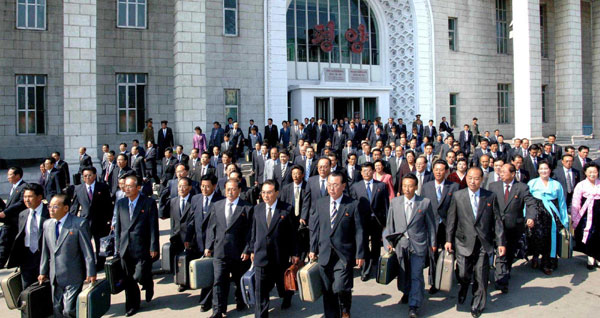Asia-Pacific
Key facts about DPRK ruling party conference
(Xinhua)
Updated: 2010-09-28 10:27
 |
Large Medium Small |
|
 Party delegates arrive at the railway station in Pyongyang Sept 26, 2010. The Workers' Party of Korea (WPK), the ruling party of the Democratic People's Republic of Korea (DPRK), is to hold a major conference on Tuesday, Sept 28, 2010.[Photo/Xinhua] |
The Rodong Sinmun, the WPK's official newspaper, said in its September 23 report that to celebrate the 65th anniversary of the founding of the WPK and to further develop and strengthen the party, as well as to improve the party's effectiveness, the Political Bureau of the WPK's Central Committee decided to hold the conference.
According to the charter of the WPK, the Central Committee of the Workers' Party can hold a WPK conference between the party's two national congresses.
The WPK conference can debate and make decisions on urgent issues such as the party's routes, policies, strategies, personnel changes and tactics.
The process of electing party members and the proportion are prescribed by the Central Committee of the WPK.
The DPRK has previously held two WPK conferences - one in March 1958 and the other in October 1966.
The first such conference summed up the nation's anti-sectarian campaign and raised the issues of strengthening unification and solidarity within the party.
The conference also discussed the basic guidelines for a five-year plan to boost the national economy, and set the goal of economic development and concrete measures to achieve it, stressing that while continuing to develop the heavy industry, the light industry and agriculture should also be developed at the same time.
At the second WPK conference, then DPRK leader Kim Il Sung gave a speech titled the "Situation at Present and Tasks of Our Party," in which he analyzed the international situation and clarified the principles and position of the WPK in the international socialist movement.
The strategies and guidelines of enhancing the fight against imperialism and the United States were also put forward at the conference.
The conference also laid down the guidelines of paying equal attention to economic construction and defense construction.



